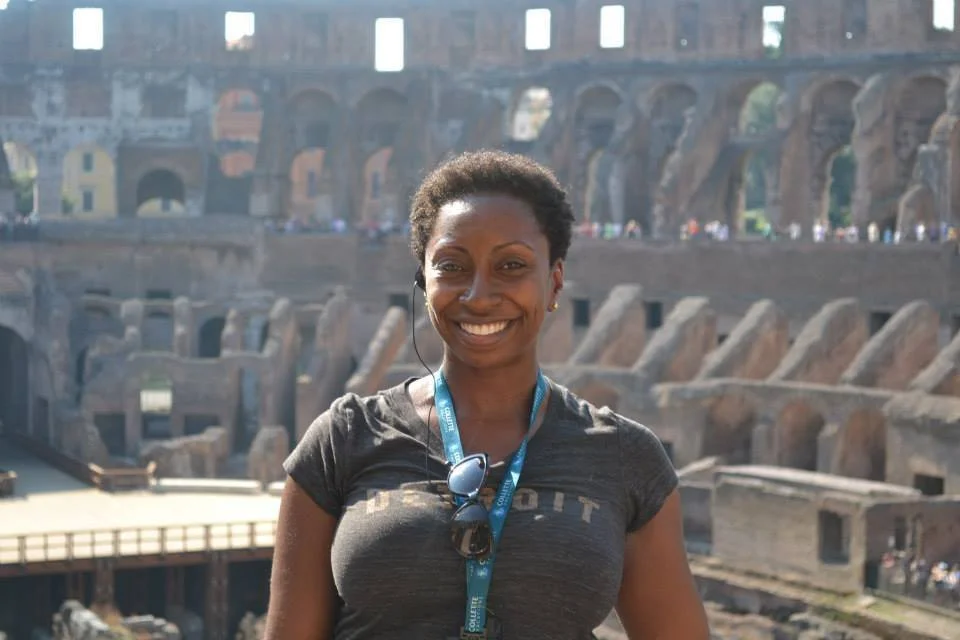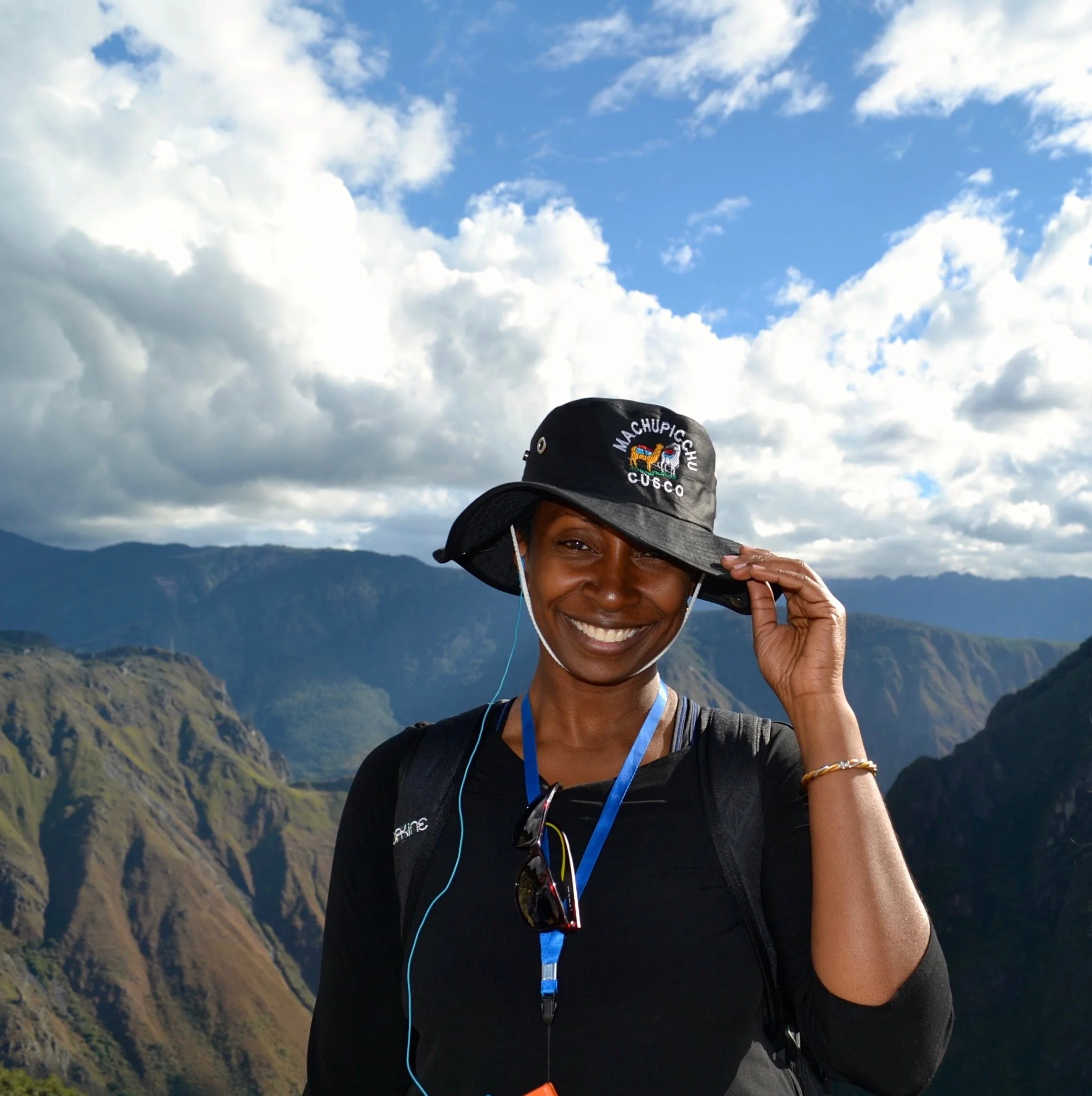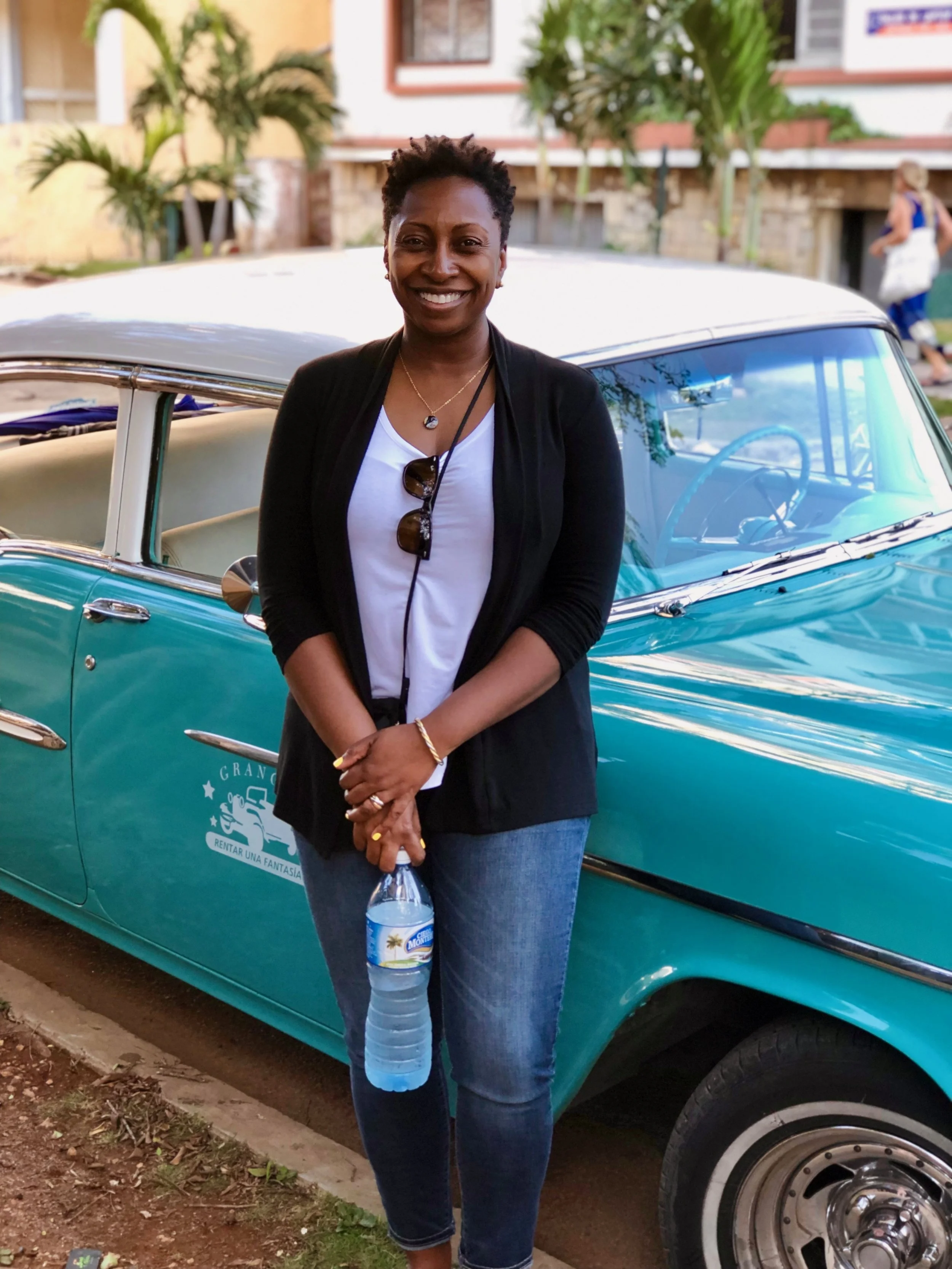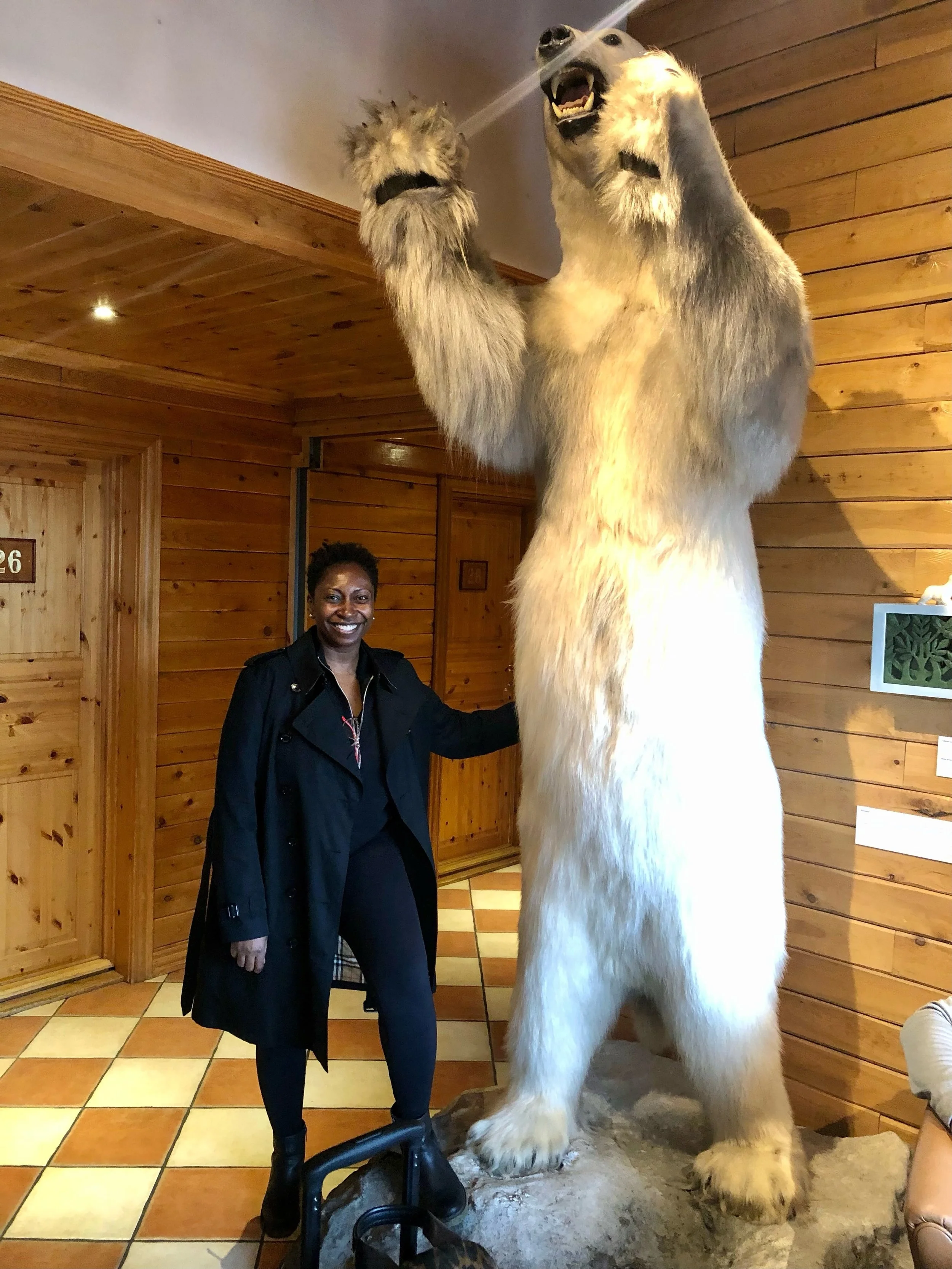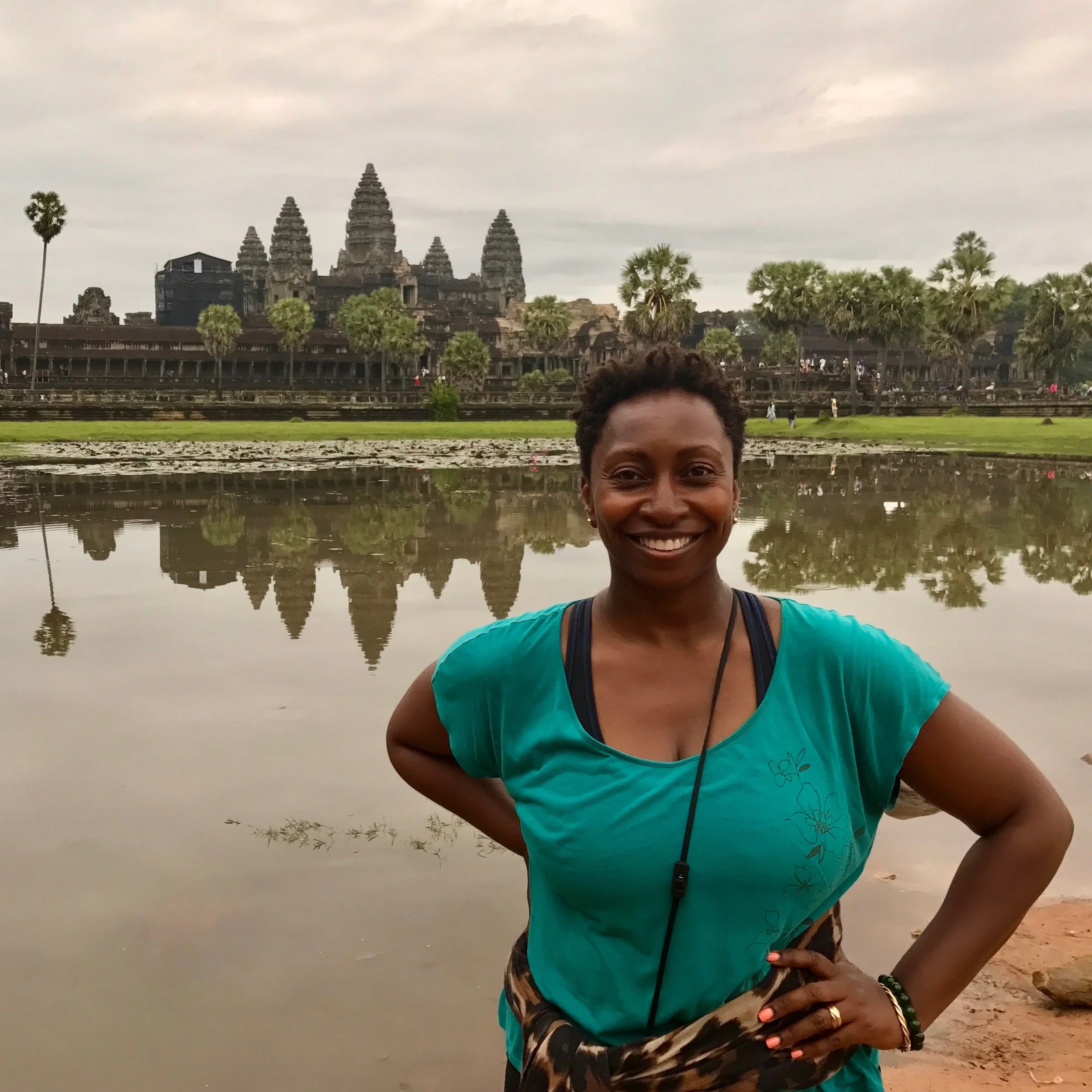“A lot of yoga is about letting go—it’s not just about your body—it’s actually about your life. ”
The number one thing we love most about Thrive is the incredible people that make up our community. We feel so fortunate to have met so many of you over the years; when we hear your stories, we gain a whole new perspective and appreciation for why you keep showing up to practice. Often, we’re so in our own heads when we enter the studio that it is nice to take a step back and look around us. Get to know some of your fellow yogis so that you can connect with them on a deeper level.
We’re happy to get you started by introducing you to Hot Yoga powerhouse Rita Fields. She has overcome obstacles many of us could only dream of through her strong will, pure determination, and self-care. We hope her story inspires and motivates you as much as it did us.
Meet Dr. Rita Fields.
Jenny: Rita. Thank you so much for doing this. I really appreciate it. I thought we could start talking about your background and what you do because you are a doctor—Dr. Fields. You have such an impressive resume.
Rita: Yes. I have a very—I like to call it “a diverse professional life.” I spent a long time doing what everybody does—it's just “have a job,” right? I was bored. It took me years to realize that I had a bit more capacity. So 10 years ago, I quit my corporate job. My goal was to live a life that allowed me to have time to read, write and travel. That was it. All my work had to serve those ends.
I’ve had a very hard long life, and I realized I should probably start thinking about living for myself. It starts with your job because a lot of data points to the fact that the typical person spends the absolute biggest part of their life at work. Which I think it's disgusting. I just didn't want to go out like that. I started an HR consulting firm 10 years ago this year. I have a manufacturing company with my husband. I'm a professor— I've been teaching for about 15 years at the collegiate level. And I'm also the chief HR officer at Lighthouse in Oakland County.
And what is interesting about that job is that when I was 17, I ran away from home. I dropped out of high school. I ended up homeless and on the street. I got pregnant and ended up at a shelter—South Oakland Shelter. I was able to stay there for a month, then I went home, and I had my son. Years went by, and then when I was finishing my master's, I decided to come back to serve on the board. I was on the board for almost 15 years when they offered me a position. Lighthouse merged with South Oakland Shelter, so I now get to serve where I was a resident 30-something years ago—I could not say no to that job.
Jenny: Wow, that's a lot! Your story about Lighthouse gave me chills all over. What an incredible story. How amazing. So, Rita, you said the average person spends the majority of their time working? Do you think you spend more of that time working than the average person? Or have you found a way to integrate all of these jobs with minimal effort?
Rita: That's a great question. I've actually thought a lot about that. I work less than the typical person does—I work very differently. Some weeks, I might put in 40 hours, but often I don't.
One of the things about having your own business is that you're extremely cognizant of how much time you're wasting. I didn't realize when I was working full time in corporate that most of my week was a waste. I was just sitting in meetings, listening to stuff that I already knew, and doing stuff to support somebody else.
When I have control of my time, I'm very good at balancing. I make time to work out every day. I make time to connect with people that I care about every day. I go sit in the sun. I try to do it every day because vitamin D is very good for you. So most people don't get the time to do that, and I do. I read every day. I write, not every day but close. I travel all over the place. So yeah, I think I work less than the typical person, even though I have more jobs.
Jenny: So let's talk travel. Because you just went on an amazing trip to Antarctica. What inspired you to take that trip?
Rita: Antarctica was the seventh and last continent for me to visit in the world. I went to Australia in 2014. And that was the sixth continent. And so it's taken me 10 years to really build up the courage to go because I can't swim. I hate boats like I HATE boats. I went on a cruise once and despised it. I can get really, really motion-sick in a car, let alone on a boat.
I started researching this 10 years ago and was scared to go—it's a big trip. It took two and a half days for me to get there and two and a half days to get back. So half of my 10 days was literally traveling. So I had been debating, and I'm like, well maybe I don't have to do the seventh continent; six is pretty good. Then I told myself I’m just gonna have to get over being afraid and book it, and so I did.
I was terrified the whole time. I booked it a year in advance so I could start to prep myself. And even when I got there, it was still so much bigger than what I thought. I have like little snippets of a video where you can hear me saying, “What are you doing here?”. It was beautiful. It was amazing. But I was scared a good portion of the time. So when I came home, I was exhausted because I had been basically clenched for 10 days.
Jenny: And how was the motion sickness?
Rita: It was significant because we were on this ocean liner, and at one point, the winds got up to like 150 miles an hour, and it was below zero temp, and on the open seas, you're not getting the buffer that you would get in between some of the mountains and glaciers, and you can only go so fast. And so there were a couple of nights where I would be laying in bed and just sliding around. There were people that got really, really sick—thankfully, I wasn't one of them. But it was uncomfortable. It was consistently uncomfortable.
I was struck by how awesome nature is. When we asked the Captain on a scale from 1 to 10 how bad this is compared to what he's experienced in Antarctica, he said it was a 0.3. That is not even a 1!!! Are you kidding me? He's like, ‘Yeah, really.’ So I can't even imagine that. What a wild job. It's a cool job. It isn't for everybody. I thought it was really interesting.
Jenny: Well, thanks for sharing that story. I mean, it's so impressive that you have the vision and scope to see all seven continents and see the whole world. I just love the way you view life and view the world. So Rita, what made you start practicing yoga? How did your yoga journey begin?
Rita: So I mentioned 10 years ago that I did this whole turning of my life. I was miserable. I was coming out of a divorce. I was not working out at all. I was incredibly stressed. And a friend of mine said, ‘You should try Bikram Yoga.’ I had never heard of Bikram Yoga. And I was like, ‘What is that?’. And she’s like, ‘It’s basically hot yoga.’ And I was like, ‘Well, okay, is it really hot?”. And she's like, ‘It’s a little hot”. So then I started researching, and I'm like, “It's hot as hell in there! I don’t know if I want to do that!”. And she's like, ‘But it'll be really good for flexibility.’
So I started it. I remember my very first class. I started with you guys in the corner studio in Farmington Hills. I distinctly remember my first class. I was so hot, and I was so out of it that I was dissociating, and I didn’t realize it. I thought I was in a tree house.
Jenny: Oh my gosh.
Rita: I’m lying in the Savasana, “Oh, it's too hard.” It was really disconcerting. “I don't know if I can do this. How can these people do it?”. I was sweating profusely. I was ravenously thirsty, and I would look around and see people just looking at themselves in the mirror, and I'm like. “Is something wrong with them?”. But I kept coming back. And I would bring in my Blackberry.
Jenny: I forgot about Blackberries!
Rita: I was so afraid because at that time I hadn't quit my job yet. I was just starting to be aware that I lived a life that I hated, and that I needed to move in a different direction. So I was scared to leave my phone outside of the room. I probably brought my phone into the room for the first six months. It would vibrate, I would look at it, and it would give me a distraction from the fact that I felt like I was dying.
“I was trying to pay attention to how to do the poses, I would forget about work. I slowly weaned myself and would leave my phone outside in the cubby. It would be 90 minutes of me not being bothered, just focusing on being in this space.”
And then eventually, I started to notice that while I was trying to pay attention to how to do the poses, I would forget about work. I slowly weaned myself and would leave my phone outside in the cubby. It would be 90 minutes of me not being bothered, just focusing on being in this space.
And I was like, wow— it became a point of refuge for me. It was like a moving massage. So it really kickstarted my commitment to working out and all that good stuff.
That's really why I started to come because I was trying to escape my life. And then I started to realize that I could actually focus on creating space inside of my head to try to find my life—in the yoga room.
Jenny: Rita, that is so beautiful. And it's exactly how I feel about yoga because you can walk in with all the stress, all of these worries like you carry your life into the room. All of a sudden, it's a blank space, and then your body is moving, and it's releasing the tension that you brought in. And then some of my best ideas have come from just being empty-minded at yoga.
Rita: Yes, you are so right. I’ve told people that literally. I’ll have some problems that I cannot figure out, and because I have five jobs and a fairly busy life, sometimes I don't have the space, but when you're in the yoga room, you have space whether you want to or not. I'll be in a pose, and a solution will come, and I'll be like, ‘That's what I'm gonna do.’
I’ve read about a concept called ‘active rest,’ basically doing something that you're focused on and you're engaged in, but it's a form of rest from our usual activities and helps us solve a problem by not focusing on the problem. Yoga is active rest for us. This is really almost a mystical thing where we can create space and find answers.
Jenny: Yes. We have the combination of the intensity of the heat plus the sensation of the yoga postures; it puts you into the present moment. You don't have to try to ‘be here now’ per se. It puts you in a state of presence that can be hard to get to when life is really busy.
Rita: I agree. Now as a more seasoned Yogi, that will still happen—I'm really focused on paying attention. I try to really listen to the instruction. And I have found over these years that I'll still hear something in an instruction that I've never heard before. I'm always trying to pay attention to where my body is because I have vertigo that is episodic.
What's interesting about suffering from something physical and still practicing is that I have to be kind to myself. As a beginner, I thought “I'm gonna frickin get this posture.” It's almost like you go through this life cycle where you want to get it. You want to look like the people that are perfect. You want to look like the poster. And then you realize you just don't have that body. I'm short-waisted, my legs are extremely long. There are certain things I'm never going to do, or it’s going to take a while because my legs are so long. Now I'm always thinking about how to make sure I'm being cognizant of my body and what my body is telling me and really trying to find that limit in the posture.
Jenny: I love that. That's such a good point, Rita, because we do this thing where we compare ourselves to other people, or what we think is an ideal in the posture, and there is no such thing. I'm so glad you brought up that point because everybody's body is different. My body is the opposite of yours. I am long-waisted, and I have short legs, so it makes postures like rabbit really hard for me. There's just no comparing to other people.
Some people come in, they're flexible, but they don't have the strength to support all that flexibility. And other people come in; they're not super flexible, but they are stable. And so we all have these qualities that are strong about our own particular body, and then we all have some weaknesses. We have to think of yoga as therapy for our bodies that's bringing us more into balance. And it really doesn't matter what anyone else in the room is doing. It truly doesn’t. It's hard to let go of that because our culture is so focused on achievement and looks, and it's like we have to almost deprogram ourselves.
Rita: I could spin out in class if I didn't take care of myself in the throes of what I'm doing. So I modify. For example, sometimes I can't keep lying down and getting upright. So I stay up. But because I value the practice, I want to go as far as I can, but I have to be tender with myself.
“It’s interesting to me how even though I’ve practiced for so long, and they’re the same postures, there’s been this really interesting evolution and maturity.”
I realized the unintended blessing of this is that I had not been very kind to myself. I've been sort of pushing myself, and I would come out, and I would be sore, or I would go too far. And when you're kinder to yourself, you have to pay attention, like I'm very flexible and can backbend really far. But if I'm in the middle of a vertigo episode, I know I shouldn’t do that, or I’ll end up on the floor.
It's interesting to me how even though I've practiced for so long, and they're the same postures, there's been this really interesting evolution and maturity.
Jenny: Speaking of maturity, I thought I'd bring this up because I know you and I have both talked about how I’m turning 47, and you are turning 50 this year. You look amazing. And one thing I always tell people is honest to goodness—in my mind, people don't look any older than the first day they start practicing yoga. You look the same as when you started. So I'm wondering how you feel about being a woman moving toward middle age, aging, and yoga.
Rita: Oh my gosh, first of all, I'm definitely middle aged. I tell people that I feel like I'm Benjamin Button; as he’s getting older, he's getting younger. Because as I continue to age, I get smarter. I tell people that when I was in my 20s, I had a ridiculously gorgeous body, a body where I literally used to cause car accidents, even though I didn't work out.
But I didn't know anything. I was so insecure. I didn't understand the power of my voice. Now I have a very strong and flexible body. I have very good balance because of yoga. I love being a woman, and I love the ability to be able to live out the rest of my life in a very intentional way.
Jenny: So I have one more question: Any advice you would give new students because you stuck with it even after having your challenging first-class experience? Something brought you back. And 80% of people who try hot yoga don't come back again because it can be so intense. So is there any advice you would give someone who's new to the practice or just getting started?
Rita: I would tell someone to consider it to be a loving practice from the beginning— be very caring about this body that's carried you through your whole life and has experienced any number of things. My body has experienced a lot of trauma. Sometimes the reason why I would be so tense, or why it would be so difficult for me to get in yoga postures, is because I've had, in a lot of ways, gone through my entire life clenched. And so, a lot of yoga is about letting go—it’s not just about your body—it’s actually about your life.
There are times when I'm in a pose, and I want to give up, and I literally will tell myself, ‘Girl, you used to eat out of the garbage can; you can hold on for 10 more seconds’, or ‘You’re incredibly strong’ or ‘Yeah, okay, you're starting to approach your limit, but you can stay in Standing Bow.’ I will remind myself how strong I've been in my life outside, and that will allow me to be physically strong too.
“I would tell someone to consider it to be a loving practice from the beginning— be very caring about this body that’s carried you through your whole life and has experienced any number of things”
I think sometimes new students often assume, ‘I'm not flexible. I can't do it.’ They don't understand that sometimes our physicality is also the consequence of what we've had to go through in life, and you should really honor that when you practice.
Jenny: Rita, you literally just gave me chills from head to toe. That's one of the most beautiful things I've ever heard. I almost started crying because that's it. We have to honor the body we have. It’s carried us through to where we are. We just don't have to live up to anything when we're practicing yoga. Even if you're just laying there on your mat, if that's what you need for 60 minutes, that is a yoga practice, just taking care of yourself. Thank you so much. Is there anything else you want to add?
Rita: I do want to say one of the things I really appreciate about being part of our Thrive studio family is the fact that yoga has not always been something that has been viewed as being accessible by people of color. And one of the things that I really love is that I see people of color all the time. I see varying people of color. I see people of varying ages.
So this studio naturally welcomes everyone, and it's not exclusionary. I've heard people say that that's not necessarily true with all studios. So I think that's kudos to you and Ian for providing the environment. I've seen people who appear to have some serious physical limitations, or they actually have a cane, and they're in class, and it's not weird. There's just always a safe space there.
And I just think that's really important because, in a world that's increasingly just mean and dismissive of the fact that we're all different, and we all have different needs, I have always found that in our studio environment, that's not been true.
Jenny: Thank you so much. I am crying now because that is really important to me. As you know, we have a daughter who has a disability, and I know what it's like to be in spaces that are not inclusive, and it doesn't feel good.
Rita: It feels horrible! And I've cried in our studios, and that sweat helps. I mean, I’ve been bawling, and you couldn’t tell because I’m drenched. The studios have absolutely, in so many ways, been a place of healing for me, and it can be for everybody. I never feel like I stick out, or I'm not important, or I'm not welcome. Never. I never felt like that.
So I thank you for that because there are lots of places where I do feel like that, and I just don’t ever go back because I don’t have to. And I’ve got time in at Thrive. I’ve had 10 years. So if you were faking it at some point, you can't fake it forever. So this is the environment, and I'm really grateful for that. And I'm always cognizant of that when new people come in.
Jenny: Thank you so much, Rita. Okay, gotta dry my eyes now. I really appreciate you sharing your story; this means a lot. Thank you.
practice like rita
On average, Rita's enjoys 2-3 classes per week of Original Hot 90 and Hot 60 Music. Discover what works best for you and establish your own routine. Check out our class schedule and click on the new student special if new or haven't been to Thrive in 12 months.
If you’re ready to take action—subscribe to our newsletter here and never miss another Thrive post.
As a thank you for subscribing, we’ll send you 3 challenges that will help you get started on getting into the best shape of your life no matter what your age is.


